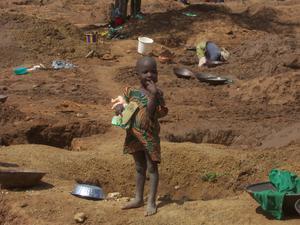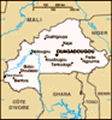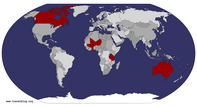Advertisement

 Gold Panning Child
Gold Panning Child
I took this photo in the field where locals practice artisanal gold panning. It's a major practice here since the land is largely incultivable. This child is on the periphery looking for her mom. Hey everyone,
I hope you're all well. Today's blog won't be a cheery one, so if you're not looking for a downer you may want to skip it. If you do, though, you'll be missing a big chance to get some insight into another place and way of life, and I think you'd be better off to check it out.
Since my trip to the field, I've been chatting a lot with my mom and others who have never been to developing countries about the conditions here. People really can't believe the extent of the poverty, and I really can't describe it fully. At first I tried to steer away from discussing the intense poverty here, just because I didn't want to make it some kind of freak show and trivialize the suffering of people here. But if talking about this can make people in Canada more aware of what's going on to our brothers and sisters over here, then I guess I have a responsibility to do that.
To give you an idea of the basic layout of the place, I've attached some stats that I pulled from Save the Children Canada (www.savethechildren.ca). They do good work here, and their website is worth a look. Anyway, here are the numbers on Burkina Faso:
Total population: 13,228,460
-They have more than a quarter of the population of Canada, yet they live in a country the size of Colorado.
Population below the poverty line: 46 %
-That's right, almost half of people live below the poverty line. Shocking, but so true. And we're not talking about "Canadian" standards of poverty here. This is also probably a lean number because street children and other marginalized groups are impossible to account for.
National debt: US$1.3 billion
-Canada has forgiven over $700 million in debt to Africa, but I don't know if any of this relates to Burkina Faso. I might have to write a letter to Peter MacKay and get him on the job!
Average annual income per capita: US$220
-This number is probably pretty shocking. I mean, even students who work evenings at Diary Queen make more in a week than these people do in a year.
Access to clean drinking water (rural): 37%
-Something most of us never think about: am I going to have water today? How many kms will I have to walk to get it? Will it come from a dirty lake or stream? Put this in a context of a desert country where the average temperature this time of year is around 40 degrees, and you see why access to water here is possibly the country's biggest issue.
Access to clean drinking water (urban): 66%
-Better than the rural communities, but still about a third of people do not have access to clean drinking water, even in the city.
Life expectancy (male): 43.02 years
Life expectancy (female): 45.94 years
-Most people here don't live long enough to have a mid-life crisis.
Infant mortality rate: 104 (per 1,000)
Child mortality rate (under 5): 197 (per 1,000)
Maternal mortality rate (from pregnancy): 1,000 (per 100,000)
-Child and maternal care here is at a premium. Villages like the ones I visited are in desperate need of midwives and natal care. The government is supposed to provide services like that, but they often fail like in so many of their programs. Even when staff are available, though, there is a lack of housing for maternal care in most villages, so they go without midwives.
Female genital mutilation is practiced on 72% of girls
-Even though I don't like the terminology they've used here, the message is the same. 'Nuff said.
People infected with HIV/AIDS: 440,000
Children infected with HIV/AIDS: 61,000
HIV/AIDS orphans: 270,000
-After Cote D'Ivoire, Burkina Faso has the highest prevelance of AIDS in West Africa. I think including the AIDS orphans number is important because we often forget that AIDS victims leave behind dependents that have no way to support themselves and rely on non-existent social services for their very survival. That's why street kids and child trafficking are big problems here.
Literacy rates of those aged 15 + (female): 36.9%
Literacy rates of those aged 15 + (male): 16.6%
-I think they possibly got these numbers reversed, because it seems impossible to me that more women here can read than men, especially considering that school enrolement is overwhelmingly full of boys. With low numbers like this, though, it hardly matters which group is more literate since both are desperately in need of school services and supplies.
So there, you have it folks, a pretty grim picture of the State of the Nation in Burkina Faso. However, at the risk of sounding like an infomercial, it's not a totally hopeless situation. The only way to go is up! And since the place is so poor, any little thing can make a really big difference. I mean it! To prove it to you, here are some numbers from info I've gathered here (these are real prices quoted to me by teaching staff and locals and from prices I've seen in stores so this is not B*s*):
Cost of sending one child to school for a year: $4 USD
-This is at the most expensive rural school I visited (which means nothing cuz they all look the same). About 60% of their students are unable to make these meagre fees, so the school operates with what little means they have for over 300 students.
Cost of books and materials for one child for one year: $10 USD
-This includes notebooks and pens for every subject. Again, most families don't have this kind of money.
Cost of one month of birth control for family planning: $0.02 USD
-I wish I were kidding on this one. Yup, about 2 cents! Ladies in Canada, we're being jipped! Actually the government here heavily subsidizes contraception, but women are often not in a position to use family funds toward this, especially in rural communities. This is mostly not a question of means (although if women had their own means I bet it would help), but mostly of priorities. The women we spoke to were very interested in family planning, but it still has to gain a lot of social acceptance among men.
Now for some bigger ticket items....
Latrines for school: $4,000 USD
-This includes 2 seperate structures (boys/girls) with 3 stalls each. None of the schools I visited had latrines of any kind, so kids just had to go out in the field to pee. They were often bitten by snakes in the rainy season when they are more prevalent, but schools don't have med-kits either to treat them.
Lodging for a teacher or midwife in a community: $6,600 USD
-This includes a mud-brick house with two rooms, an eating room, a seperate kitchen and latrines. No electricity or running water, but here that's normal.
Well for water to a school or community: about $12,000 USD
-It's hard to put an exact price on this one, but that's about what it costs to do all the hydrogeology, drill the hole, put in the well, and do some sanitation training so people know how to use it properly. For those of you who read my post about getting the well drilling and the water sample analysis donated, you'll know that we will be able to put in wells for much below this cost, thanks to our corporate contacts who've donated their services so generously.
School with three classrooms, food storage, and head teachers lodging: $24,300 USD
-This probably seems like a lot, but really it's not if you think about what putting a school in a Canadian community would cost. Millions?
The purpose of all this is to show you how great the need is here, and how much the presence of a company like ours can really impact people's living conditions. People who tell me that social responsiblity is too expensive can kiss my a**, because the numbers prove that it's possible and affordable. Numbers like these also make me think about my own situation and where I've spent money in the past (how much was that trip to the bar on my birthday...?). This isn't to say that we should live in poverty just because other people do, but it sure does make justifying some things a LOT harder.
Water is possibly the biggest place I've felt this. According to the World Water Report issued by the UN in 2005, the average person in a developing country uses the same amount of water PER DAY equivalent to one flush of a North American toilet. Chew on that one.... And remember those stats about who has clean water here? Since my first trip here, I've become very concious about how much water I use. I turn off the tap while soaping my hands to wash, or brushing my teeth, or anytime there isn't something directly under the faucet. This by no means makes me a hero, and I know that the water I'm saving doesn't put water in the mouths of people here who need it, but it seems like the best way to show my respect for the hardships they face by not wasting my own privileged access.
Anyway, I hope I've got you all thinking a bit. No commercial or movie can adequately describe the extent of the need here, or the small gesture that would make a world of difference. Hopefully my work here and increased awareness among folks at home will improve the situation of people here. There are no easy answers and sheer money won't fix the problems, but we've got to start somewhere!
-Brownie
Advertisement
Tot: 0.161s; Tpl: 0.015s; cc: 9; qc: 66; dbt: 0.1s; 1; m:domysql w:travelblog (10.17.0.13); sld: 1;
; mem: 1.2mb











krissy
non-member comment
wowzers
Hey you... Thank you for that, seriously. Even though i've been fortunate enough (and i say fortunate because seeing such ways of life shock you into understanding how much is needed, and how much we can do to help) to see for myself the poverty in Africa, it is always important to be reminded of it. You will do great things in Africa, look at you already, you are teaching us all back home! We are all proud of you xoxoxo krissy